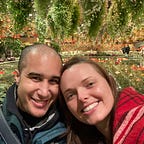A DIGITAL-AGE APPROACH TO RESILIENCE
Building resilience can be time-consuming and challenging if you are not used to counseling or seeking guidance from a coach or mentor. Many of us use phrases like “I am just figuring it out” or “I just need to put my nose to the grindstone to get the job done.” However, this is becoming increasingly difficult to do in the Digital Age, and self-correction becomes nearly impossible because there are so many blind spots that cannot see. We all want to build resilience, but how do we do that? First, we should define strength.
According to the American Psychological Association:
Psychologists define resilience as the process of adapting well in the face of adversity, trauma, tragedy, threats, or significant sources of stress — such as family and relationship problems, serious health problems, or workplace and financial stressors. As much as resilience involves “bouncing back” from these difficult experiences, it can also involve profound personal growth. — APA, 2020
Now let’s see how this relates to us professionals today and how we can implement techniques that we can easily replicate in our current work and personal situations.
ADAPTING TO THE INCONVENIENT, UNEXPECTED, AND INEVITABLE CHANGE
It is undeniable that we all experience change in our lives. It may be inconvenient unexpected, but one thing is for sure: it will happen. We build our resilience through our ability to plan to put us in a better position when change occurs. However, this is impossible if you are traveling independently and trying to navigate the journey on your own. You are both an intelligent and practical planner, as well as a well-prepared and sharp individual.
Nevertheless, you cannot plan for everything. Having counsel from those who have already traveled the path you are on can be a great resource. Since they have traveled in the same direction as you, they have access to information that you may not have access to. Networking and connecting with someone open and willing to coach and mentor you is an essential tool for preparing for the inconvenient and unexpected throughout your professional journey.
However, we are not always preparing for inconvenient or unexpected work changes. Occasionally, we are all faced with the unexpected and the inconvenient in our lives. A mentor and coach can also facilitate these events. Nonetheless, this is a call to ensure we build authentic and trusting relationships with those around us. We forget that we are relational creatures and need to make tribes of people who can support us through life’s challenges. You may need to learn how to connect with your neighbors and build relationships in your community. You can do this by joining Meetup groups or Facebook groups with like-minded people, increasing your tribe. We cannot live all our lives alone.
BUILDING A RESILIENCE PLAN
Your Resilience Plan should include family planning, and you should consult a professional. Nevertheless, reliance planning begins with mental preparation, which is the power of personal development described in the definition. It’s too easy to make these kinds of things into checkboxes, and we forget how important the little things we do every day are to planning and becoming more resilient.
The average person spends a good deal of time on their phone, commenting on Facebook, and reading political commentary. Negativity is a regular part of our lives, and the world we live in does not contradict this. How resilient are we to those harmful pollutants? What are we doing to become more resilient to stress and avoid its harmful effects? Likely, most of us (including myself) have never thought about how daily stimuli can undermine our resilience.
It is crucial to have people around you who know you and can speak life into you when facing these situations. The benefit of these people comes in the long run, not the short run since resilience is a long-term game. However, you aren’t just looking for people to tell you what you want to hear. It’s sometimes necessary for people to also tell you what you need to hear. We should all strive to create relationships with both of these types of people in our lives. This is also one reason we cannot do things on our own in the Digital Age.
ESSENTIAL TECHNIQUES FOR DAILY RESILIENCE
- Develop supportive relationships
- Accept the inevitable change
- Set goals that are realistic
- Be decisive
- Understand your own experience and acknowledge your journey
- Develop a healthy and positive view of yourself and where you are at
- Stay hopeful. Every season is just that, a season
- Acknowledge and allow others to help
There are probably many more items I could have included. I am sure others are encouraging you in similar ways as well. Incorporating these aspects into my journey has helped me grow, and I have learned them and am teaching them to others. There is no particular order to these, and I am constantly improving them. The goal is to be aware of where one is at and strive to be 1% better tomorrow than one was yesterday.
Through working with my mentor, I cleared up so many blind spots, both professionally and personally. The gift of vision that I have received from relying on those who have traveled in the same direction as me, but further ahead, has given me the gift of avoiding some pitfalls and traps that might have ensnared me and kept me further trapped.
Be grateful if this is where you are. You are exactly where you need to be at this moment. You can only achieve where you want to be if you are aware of it.
